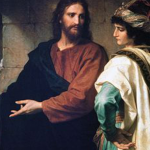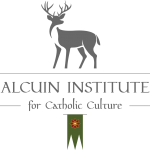
Dr. Aaron Henderson is a Faculty Tutor for the Alcuin Institute for Catholic Culture.
30th Anniversary of Veritatis Splendor
St. John Paul II wrote, during his relatively lengthy reign as Supreme Pontiff, many noteworthy and helpful documents. His first encyclical, Redemptor Hominis, reminded the faithful of the efficacy and…
Third Wednesday Reading Group: A Christmas Carol
o you want to grow in the intellectual life and make new friends along the way? Join the Alcuin Institute faculty on the third Wednesday of each month this academic…
Third Wednesday Reading Group: Babette’s Feast
Do you want to grow in the intellectual life and make new friends along the way? Join the Alcuin Institute faculty on the third Wednesday of each month this academic…
Third Wednesday Reading Group: Frankenstein
Do you want to grow in the intellectual life and make new friends along the way? Join the Alcuin Institute faculty on the third Wednesday of each month this academic…
Third Wednesday Reading Group: Pinocchio
Do you want to grow in the intellectual life and make new friends along the way? Join the Alcuin Institute faculty on the third Wednesday of each month this academic…






